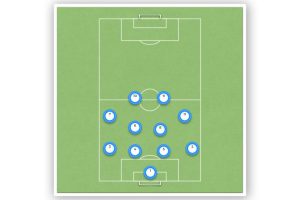Developing Mental Toughness In Soccer
Are you a soccer player looking to take your game to the next level? Mental toughness is one of the most important assets for any athlete, especially in soccer. It’s not enough to just be physically fit; you need to be mentally tough too. This article will explore ways to develop mental toughness on the soccer pitch.
As a mental toughness coach for soccer, I have seen firsthand how much of an impact having a strong mental game can have on athletes. Knowing how to maintain focus and strength during the pressure moments of a match can be the difference between winning and losing. Soccer players need to use their minds as well as their bodies if they want to reach peak performance levels.
In this article, I’ll share with you practical tips and techniques that you can use right away to start building your mental toughness on the soccer field. We’ll look at how you can stay positive even when things don’t go your way, how visualization and goal setting can help create success, and strategies for dealing with distractions during matches. By using these tools and skills, you’ll become more confident, resilient and unstoppable on the pitch!
Definition Of Mental Toughness
Mental toughness is an invaluable attribute for any soccer player. It’s the ability to push yourself beyond your comfort zone and persevere in difficult situations. Mental toughness means staying focused and composed when facing adversity, handling pressure and setbacks, and staying motivated to keep going. To be mentally tough means you have an unshakeable belief that you can tackle any challenge that comes your way.
Put simply, mental toughness is having the inner strength that allows you to stay resilient even when times are tough. It’s about having the mental fortitude to make tough decisions under pressure and keep pushing forward no matter what obstacles may arise. That’s why developing mental toughness is essential for any soccer player who wants to reach their full potential on the field.
Benefits Of Mental Toughness In Soccer
Like the sharp blade of a sword, mental toughness can be honed and developed in soccer players. The benefits of having strong mental fortitude on the pitch are countless. Here I will discuss the three main benefits that come with having mental toughness in soccer:
- Improved Performance: A mentally tough player will be able to focus and concentrate better during games, which leads to improved performance on the field. They can also stay calmer under pressure, handle mistakes more effectively, and remain composed when faced with adversity.
- Increased Confidence: When a player is mentally tough, they become more confident in their abilities and capabilities as a soccer player. This confidence leads to better decision-making on the field and improved communication with teammates.
- Increased Resilience: Having mental toughness allows players to bounce back from setbacks quickly, giving them an edge over opponents who may become demoralized after taking a loss or making a mistake during play. Mentally tough players have the ability to turn losses into learning experiences so they can grow as players and as people.
Mental toughness is an essential skill for any serious soccer player who is seeking success on the field. With dedication and practice, any player can improve their mental strength which will result in better overall performance throughout their career in soccer.
Developing Concentration And Focus
Focus and concentration are essential elements of mental toughness in soccer. Developing the ability to stay focused, even when faced with distractions, is a key part of developing mental discipline. To do this, you must be able to recognize when your mind starts to wander and have the self-control to bring it back into focus. This involves developing mental clarity by knowing what you need to focus on and being able to quickly return your attention there if it strays.
The importance of concentration and focus in soccer cannot be overstated. It’s essential for success in the game because players need both to make effective decisions in a fast-paced environment. They also need it to maintain their composure and remain calm under pressure. Without it, they are more likely to make mistakes or become overwhelmed by their opponents. That’s why developing these skills is so important for any aspiring soccer player who wants to become mentally tough.
Cultivating A Positive Mindset
Now that concentration and focus have been developed, it’s time to move on to the next step – cultivating a positive mindset. When it comes to soccer, having a positive mental attitude can be the difference between winning and losing. A player’s mental outlook affects their performance both on and off the field. It can even affect the team dynamics in a big way.
Here are three key components of cultivating a positive mindset:
- Developing Self-Confidence: The more confident you are in yourself and your abilities, the better your chances of success in any endeavor. Building self-confidence requires self-awareness as well as developing an understanding of one’s strengths and weaknesses.
- Changing Your Perspective: Changing your perspective is about looking at things from different angles or points of view. This helps to keep our minds open and allows us to find solutions that may not have been apparent before. It also helps us to stay calm in stressful situations and make more informed decisions.
- Staying Positive: Staying positive means focusing on the positives in every situation rather than dwelling on the negatives. Having a positive attitude will help you stay motivated, work hard, remain optimistic, and stay focused on achieving your goals despite any obstacles that come along the way.
These three components form the foundation for cultivating a strong mental attitude in soccer players which can lead to greater success both on and off the field. With dedication and practice, players can develop this skill over time, becoming mentally tougher each day they step onto the pitch!
Strategies For Handling Adversity
Some may think that it can’t be taught, but developing mental toughness in soccer involves learning how to handle adversity. Adversity is inevitable and a part of the game, and players must learn strategies to help them stay focused and resilient when facing difficult situations. The key to mental resilience lies in being able to work through the challenges and setbacks that come with playing soccer.
Adversity strategies vary depending on the individual player; however, there are several core techniques that are beneficial for all players when dealing with soccer adversity. For starters, it is important to remain composed and focused on the task at hand. By staying positive and believing in oneself, a player can maintain control of their emotions and stay motivated. It is also important to seek support from teammates and coaches if needed; having someone who can provide guidance or encouragement during difficult times can be incredibly beneficial for helping players navigate their way through challenging moments.
The only way to develop mental toughness in soccer is by learning how to handle adversity once it arises. With the right strategies, players can develop the necessary skills to stay focused under pressure, persevere through difficult moments, and ultimately become mentally resilient.
Techniques For Managing Stress And Anxiety
Now that we understand the importance of handling adversity, let’s look at techniques for managing stress and anxiety. Soccer players need to develop mental strength in order to withstand the pressure that comes with competition. Stress and anxiety can take a toll on performance if they aren’t managed properly. Fortunately, there are various relaxation techniques that soccer players can use to help them stay calm in high-pressure situations.
Breathing exercises are one of the most effective ways for athletes to manage their stress levels. Taking deep breaths helps to reduce tension, relaxes muscles, and increases focus. Visualization is another tool soccer players can utilize in order to stay composed during games and practices. By picturing themselves succeeding in their minds, athletes can boost their confidence and make it easier for them to perform under pressure. Finally, soccer players should practice positive self-talk as a way of calming down before or during a match. When things get tough, players should remind themselves of all their accomplishments and why they love playing the game.
Mental toughness is essential for any soccer player who wants to perform at their highest level. It’s important for athletes to develop healthy stress management strategies in order to compete effectively under pressure. With proper relaxation techniques like breathing exercises, visualization, and positive self-talk, soccer players will be able to better handle stressful situations on the field while achieving peak performance levels each time they step onto the pitch.
How To Visualize Success
Visualizing success is an essential component of developing mental toughness in soccer. It’s like planting a seed in your mind; the more you nurture it, the more it will grow and become a part of you. Picture yourself in the future as a successful athlete, playing at your highest level and achieving all of your goals. Let your mind wander and create a vivid image of what this future will look like for you. Imagine how confident you will feel on the field, how hard you are willing to work, and how well you will handle adversity and stress.
Now that you have created this image in your mind, practice visualizing it every day. Before games, take time to close your eyes and see yourself performing well and feeling strong mentally under any circumstance. This visualization will help build up positive thoughts before any competition or difficult situation arises. Being able to envision success can significantly increase your mental toughness – making it easier to handle anxiety or stress during games or other challenging moments. Additionally, picturing yourself succeeding can give that extra boost of confidence needed to stay focused and motivated throughout the season. Visualizing success is an invaluable tool that all soccer players should use when striving for mental toughness.
Building Self-Confidence
Once you’ve mastered how to visualize success, it’s time to focus on building your self-confidence. Soccer players who have a strong sense of self-confidence are able to perform at their best and reach their full potential. This is why developing self-esteem in soccer is such an important part of mental toughness training.
There are a few practical steps that soccer players can take to enhance their performance by developing their self-confidence:
1) Start small and set achievable goals. Make sure they’re realistic and that they stretch you just enough. You’ll be surprised by how far you can go when you start with simple goals and keep achieving them.
2) Identify what makes you unique as a player and use that to your advantage. Every player has different skills, so don’t be afraid to show off yours!
3) Surround yourself with positive people who believe in you and your abilities as a soccer player. Having people cheering for you will help boost your confidence levels significantly when the going gets tough.
4) Focus on the process rather than the outcome – don’t get too caught up in winning or losing, but instead focus on honing your skills and learning from every experience, both good and bad.
5) Believe in yourself –you are capable of doing more than you think! Acknowledge all the hard work you have put into becoming the best version of yourself as a soccer player, and never let anyone bring you down or tell you otherwise.
By following these steps, soccer players can build up their self-confidence over time and become mentally tough athletes who are well prepared for any situation they may come across on the pitch!
Staying Motivated And Committed
Motivation and commitment are an essential part of developing mental toughness in soccer. It’s important to stay focused on your goals and strive to reach them, no matter the obstacles. To remain motivated and committed, start by visualizing your desired outcome. Picture yourself as a successful soccer player, achieving all the goals you’ve set for yourself. This will help keep you motivated and remind you of why you’re playing in the first place.
It’s also important to develop a positive attitude towards training and competing. A positive attitude can help motivate you to stay committed to reaching your goals. Focus on what you can do to improve instead of dwelling on defeats or mistakes that were made during practice or games. Believe in yourself and trust that all the training, hard work, and dedication will pay off in the end.
Focus on taking one step at a time when it comes to developing mental toughness for soccer. Celebrate small successes along the way, no matter how insignificant they may seem now, as these successes will add up over time and build confidence in your abilities as a soccer player. Keep striving for improvement each day and take pride in your accomplishments – this will help keep you motivated and committed to becoming mentally tough for soccer success!
Practicing Effective Goal Setting
Having the correct attitude and staying motivated is a strong foundation for mental toughness in soccer. But it’s not enough. Now it’s time to move on to the next step, which is learning how to practice effective goal setting.
The truth is that successful soccer players don’t just rely on their physical skills; they also have a knack for setting and achieving goals. This means that learning how to set achievable goals and then following through with them is essential for developing mental toughness in soccer.
When it comes to soccer goal-setting, players must be specific about what they want to achieve. It’s not enough to say “I want to be a better player” – this kind of goal isn’t clear enough or measurable. Instead, players should focus on creating more tangible goals such as “I want to increase my speed by 6% over the next six weeks” or “I want to score 10 goals by the end of the season”. This type of mental toughness goal-setting allows players to track their progress, measure their successes, and stay motivated throughout their training journey.
Similarly, physical goal-setting is equally important for soccer players looking to develop mental toughness. Players should create measurable goals related to physical conditioning such as increasing strength or endurance levels, increasing flexibility or agility, or reducing body fat percentage over time. Again, these kinds of specific goals make it easier for athletes to track their progress and stay motivated during their training sessions.
With effective goal-setting strategies in place, soccer players can develop greater self-discipline and mental toughness while pushing themselves towards ever greater success on the pitch
Frequently Asked Questions
What Age Group Should Start Developing Mental Toughness?
Mental toughness is an important attribute to cultivate in any athlete, especially those playing soccer. It’s essential for success on the field, and being able to stay cool under pressure can make all the difference. But when it comes to developing mental toughness, what age group should start?
When it comes to young athletes, we often think of them as being too easily distracted or not having the focus needed to be successful on the pitch. However, this isn’t necessarily true. Mental toughness can be developed at any age and the sooner you start instilling these habits in your players, the better they will become over time.
It’s important that coaches don’t overlook this area of development because mental toughness is essential for success in soccer. Players need to be able to handle difficult situations on the field while still maintaining focus and composure – something that won’t come naturally without practice and guidance. That’s why it’s important for coaches to provide opportunities for their players to practice good mental habits from a young age so that they can learn how to keep their heads in tough moments and take advantage of their opportunities when they arise.
How Long Does It Take To Develop Mental Toughness?
Mental toughness is an important part of any athlete’s success. Whether it be a soccer player on the field or a weightlifter in the gym, having the mental fortitude to stay focused and motivated can make all the difference. But how long does it take to develop this mental edge?
The amount of time it takes to build mental toughness varies from person to person. Some athletes are naturally more resilient than others, while some need more practice and dedication when developing their mental toughness. It also depends on the intensity of the exercise they’re doing and the level they want to achieve.
In order to develop mental toughness, there are certain exercises that can help athletes build their resilience. These include visualization exercises, such as picturing yourself achieving success or remaining calm in a stressful situation, as well as breathing techniques that can help you remain relaxed in pressurized moments. Other activities such as strength training, yoga and meditation can also play an important role in developing your mental game.
To be successful at developing mental toughness for soccer players, coaches should create an environment where players feel safe and supported while challenging them mentally and physically. Coaches should provide individualized guidance and support with repetition of key elements through drills and activities such as:
- Cognitive Training:
- Mental Imagery Practice
- Pre-game Preparation
- Physical Training:
- Stress Management Exercises
- Goal Setting Strategies
When coaching soccer players through their development of mental toughness it is important to remember that everyone progresses differently so patience is key. Every player will have different strengths and weaknesses so coaches must tailor their strategies accordingly if they want their athletes to reach their full potential both on and off the field. With time, dedication, focus and effort any athlete has the ability to become mentally tougher no matter their age or experience level.
What Is The Best Way To Cultivate A Positive Mindset?
If you want to develop mental toughness in soccer, the best place to start is by cultivating a positive attitude. Mental strength, resilience, discipline and fortitude can all be strengthened with a positive outlook. It’s like taking a rocket ship to the stars!
The most important thing when it comes to developing mental toughness is to never let your thoughts or emotions get the better of you. You need to be able to control them and not let them control you. This means having an open mind and being willing to learn from your mistakes and successes, as well as being honest with yourself about what works and doesn’t work for you.
Having an attitude of acceptance, gratitude and self-awareness will help you become more mentally resilient. Taking time out of each day for reflection and self-care is also essential. Learning how to properly manage your emotions will help cultivate a strong mental game that will carry over into other areas of life as well. Developing mental fortitude requires dedication, practice and consistency – but it’s worth it in the end!
How Can I Keep My Motivation And Commitment To Soccer High?
Developing mental resilience and commitment to soccer can be difficult, but it is key for any aspiring athlete. When your motivation and dedication levels start to dip, it can be challenging to stay focused on the game. As a mental toughness coach for soccer, I believe that there are several strategies that can help you keep your motivation and commitment high.
The first strategy is to set long-term goals. You should aim to improve your skills over time, while also having fun playing the game. It’s easy to become discouraged when things don’t go your way or when you make mistakes, but staying focused on the end goal will help you stay motivated and dedicated. Additionally, breaking up larger goals into smaller chunks makes them more achievable and helps keep you on track.
Another important strategy is to take care of yourself both physically and mentally. Eat nutritiously, get enough sleep, exercise regularly, make sure you have some down time each day – these are all essential for maintaining high levels of commitment and motivation in soccer. Lastly, surround yourself with positive people who support your journey towards becoming mentally tough in soccer. Having a strong support system will provide you with the energy and encouragement needed to stay focused on your long-term goals.
Are There Any Specific Drills That Can Help Improve Mental Toughness?
Mental toughness is an important aspect of soccer. It can be a deciding factor when it comes to competing on the field, and drills can help players develop their mental toughness. So, are there any specific drills that can help improve mental toughness? Absolutely! There are many different soccer drills that target mental toughness specifically. These drills focus on cultivating a positive mindset and building resilience in order to enhance performance on the pitch.
Mental training drills, such as visualizing success or overcoming adversity with a strong attitude, can help players cultivate a more resilient mentality. Other mental toughness exercises include practicing deep breathing before matches or physical activities that emphasize teamwork and leadership skills. Additionally, coaches often incorporate psychological strategies into their practice plans such as goal setting and using positive self-talk to increase motivation and confidence in their team members.
These types of soccer drills can help players sharpen their mental game by increasing their focus and concentration during practices and matches. By implementing these techniques into practice sessions, coaches can ensure that their athletes become mentally tougher over time, which will ultimately lead to improved performances out on the field.
Conclusion
When it comes to developing mental toughness in soccer, it is never too early to start. As a coach, I strive to instill the importance of having a positive mindset in my players from day one. With consistent practice and repetition, my players can build their mental strength over time and become resilient athletes.
To keep motivation and commitment high, I always remind my players that success is built on hard work and dedication. I encourage them to visualize themselves achieving their goals and imagine the feeling of accomplishment they will have when they reach their peak performance.
By introducing drills that focus on mental toughness, such as goal setting or visualizing success, my players can gain confidence in themselves both on and off the field. As long as you stay committed to your team and the sport, you can develop mental fortitude that will make you an unstoppable force on the pitch!







